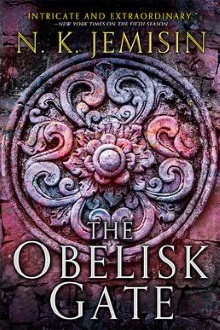
When I wrote my post about The Fifth Season I said I would be onboard for the next book and so here I am. Even so I am a little miffed that both books won Hugo Awards and the third book is similarly on track to do so. The rest of the nominees are no better, being novels that are part of a series by the same authors who win year after year. It’s honestly rather boring so it’s no wonder why Liu Cixin’s win in 2015 was such a breath of fresh air even if I didn’t like the book very much.
The plot picks up on Essun’s story immediately after the events of the first book. Following her arrival in the orogene-friendly comm of Castrima and having lost her daughter’s trail, she resolves to once again make a life there. The dying Alabaster, parts of his body turning to stone, is there as well and does his best to complete Essun’s training, teaching her the basics of going beyond even orogeny. The most surprising part of the novel however is that it finally reveals Nassun’s story after her father takes her south away from Tirimo. Her journey with Jijia of a year or so is glossed over but it is revealed how she survived Jijia’s wrath and how her love for her father is steadily sacrifices as she realizes that she needs to manipulate him to live. In a not altogether surprising twist, Schaffa, Essun’s assigned Guardian, has survived the events at Meov and encounters Nassun. It is therefore Schaffa who ends up completing Nassun’s training.
After the fast paced narrative of the first book and with the heavy lifting work of worldbuilding already done, The Obelisk Gate feels markedly more sedate. With Essun’s character now a settled issue, it is Nassun who now seems more interesting. It is inevitable but still agonizing to read about how the Fulcrum-style training that Essun subjected her daughter to so that she can control her power mirrors the treatment that Essun herself received from Schaffa and caused Nassun to believe that her mother doesn’t love her. I also liked the lore about the nature of the stone eaters, the obelisks and how this planet once had a moon and it was the loss of the moon that caused the Evil Earth itself to hate the humans who live on its surface. I’m more leery of how orogeny is expanded into a vaguely defined mastery of magic but I suppose it’s too much to expect that everything has a neat scientific explanation.
The prose is as good as ever and as before, I really appreciated how this feels like a very hip, very modern take on fantasy. It’s no mean feat to be able to invoke a sense of mystery and grandeur while describing ancient mechanisms that nevertheless work according to fairly logical principles. Overall this is a book that I enjoyed very much and I look forward to completing the trilogy. Still, it’s not exactly awe-inspiring, groundbreaking work and I’d hoped for more interesting stuff to win the annual awards.